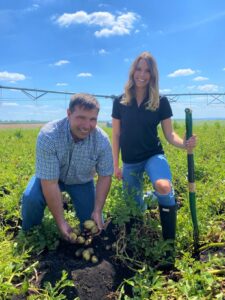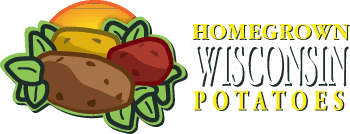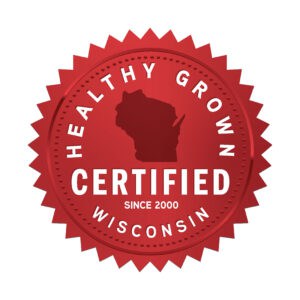by: Jenny Heap, MS, RDN
Though Wisconsin is well known for dairy, the state is fortunate to grow an impressive variety of crops. In addition to being a leading producer of tart cherries, cranberries, beets, sweet corn, and a number of other vegetables, Wisconsin ranks third in the nation for potato production and — with two western states (Idaho and Washington) taking the top spots — is the top potato-producing state east of the Mississippi. Despite this local bounty, only a small percentage of Wisconsin’s food dollars (estimates are in the single digits) stay within the state, indicating that the rest are spent on products sourced outside of Wisconsin. With such rich abundance in our own backyard, there is ample opportunity to shift this imbalance, and this wholesome local produce nourishes consumers in more ways than one. Choosing locally-sourced potatoes is a simple way for Wisconsin consumers to adopt more sustainable consumption patterns while supporting the local economy and nourishing community resilience.
Wisconsin RDNs have a unique role to play in the ecosystem of healthy living, influencing both individual health choices and community wellness. Whether counseling individuals or making menu and sourcing decisions in foodservice settings, RDNs can help cultivate sustainable consumption patterns and foster “sustainable, resilient, and healthy” [i]food systems by encouraging the use of locally-sourced produce, including Wisconsin potatoes.
Choosing Wisconsin potatoes nourishes the community in more ways than one
Environmental Benefits
For consumers looking to reduce their carbon footprint, buying local just makes sense. Purchasing fare grown nearby substantially reduces food miles — the distance food travels from farm to table — and the resulting greenhouse gas emissions from transportation. Buying local also helps keep farmland productive, preserving open spaces and preventing urban sprawl.
A preference for locally-grown potatoes also lends support to the Wisconsin Healthy Grown® program, an elevated sustainability standard introduced by local growers in the late 90’s. Program participants meet strict research-based sustainability standards related to water and soil conservation and pest management and are certified annually by a third-party. The program also supports farmers in implementing practices that protect pollinators and restore native ecosystems. In essence, buying local supports a farming community committed to preserving the environment and producing high-quality, nutrient-rich potatoes.
In 2012, Adam and Carrie Flyte partnered with Adam’s grandfather to rescue 500 acres of fallowed farmland — and created Flyte Family Farms. Today, they farm over 4,000 acres with their three children and participate in the Wisconsin Healthy Grown® program. In Carrie’s words, “It is important to us as growers to produce high-quality, healthy food that we would feed our families. We practice that tradition by eating what we grow and following research-based sustainability standards.”

In Wisconsin, potato farming is a heritage. Many operations are multi-generational family farms. Keeping food dollars local supports these farms and farm families, but that’s just the beginning. Buying local helps ensure that growers earn a fair return, strengthening their businesses and allowing them to employ more rural workers. Farmers, in turn, reinvest their dollars locally, boosting the economy, further strengthening the rural workforce, and supporting neighboring businesses that the farming community relies on. Rod Gumz co-owns a fourth-generation family farm with his brother, Richard. They grow onions and red potatoes in the rich soils of South Central Wisconsin. Specialty crops like those grown by Gumz Farms generate $6.4 billion in economic activity and — directly or indirectly — are responsible for 132,000 jobs in the state. For Gumz, reinvesting in the community is second nature. “[We do] business locally and reinvest in the region, working with area contractors, suppliers, and professionals.” The way he sees it, “It’s a cycle of support that benefits everyone.”
“Supporting local businesses strengthens the heart of the community,” he continues. “At Gumz Farms, we’re proud to be not only a local farm but also an active partner in several surrounding towns near Endeavor, Wisconsin. We support a range of local organizations, believing that strong communities start with engaged individuals and businesses.”
Community Resilience
Buying local potatoes strengthens community food distribution channels. Shorter supply chains mean more predictable cost and availability. The more we strengthen the demand for locally-produced food, the stronger these systems become and the more self-sufficient our communities can be in times of crisis. Preserving access to fresh food during times of economic downturns or supply-chain disruptions is especially important for school nutrition programs and hospital settings.
Quality and Freshness
Wisconsin’s warm days and cool nights, efficient irrigation, and groundwater recharge make the state ideal for cultivating high-quality potatoes. Produce harvested locally is often fresher than more distant alternatives because it travels fewer miles from farm to market and generally gets there more quickly. Choosing Wisconsin-grown potatoes means you are getting quality potatoes and the freshest available.
How do you know you’re buying Wisconsin-grown potatoes?
According to Dana Rady, Director of Promotions, Communication and Consumer Education with the Wisconsin Potato and Vegetable Growers Association, “The best way to know you’re buying a Wisconsin potato is to flip the bag over and look for ‘packaged and distributed by’ a location in Wisconsin. While it may take an extra step, it’s the surest way to support local farmers. If you don’t see Wisconsin potatoes at your grocery store, ask the produce manager to stock them so you can enjoy a fresher product with a smaller carbon footprint and more regional pride.”
Recipe Recommendations
Share these Wisconsin potato-inspired recipes with clients, or try them yourself for a light, satisfying late-summer meal.
https://eatwisconsinpotatoes.com/recipes/grilled-red-potato-skewers/
https://eatwisconsinpotatoes.com/recipes/grilled-lemony-dill-potato-salad/
https://eatwisconsinpotatoes.com/recipes/chile-lime-potato-tacos/
In conclusion
In Wisconsin, we are fortunate to have an ample and affordable supply of fresh, nutrient-rich, high-quality potatoes grown in our own backyard. Choosing potatoes sourced locally supports Wisconsin farmers, strengthens rural economies, fosters community resilience, and helps clients make sustainable, practical food choices rooted in regional pride.
Explore more at eatwisconsinpotatoes.com.
Content produced in partnership with the Wisconsin Potato and Vegetable Growers Association. Wisconsin Potato and Vegetable Growers Association represents growers committed to good agriculture, food safety, nutrition, traceability and providing America with fresh, high-quality produce. Wisconsin-grown potatoes offer more than just great taste. Local and sustainably sourced, they’re packed with nutrition no matter the variety. Every one of our Wisconsin Healthy Grown® farms is certified by an independent oversight organization. They ensure our growers pass annual Wisconsin Healthy Grown® Potatoes and Vegetables whole-farm audits, and that all our packers and shippers maintain the highest sustainability standards.
Look for the Wisconsin Healthy Grown® certification.
[i] Spiker M, Reinhardt S, Bruening M. Academy of Nutrition and Dietetics: Revised 2020 Standards of Professional Performance for Registered Dietitian Nutritionists (Competent, Proficient, and Expert) in Sustainable, Resilient, and Healthy Food and Water Systems. J Acad Nutr Diet. 2020;120(9):1568-1585.e28. doi:10.1016/j.jand.2020.05.010


